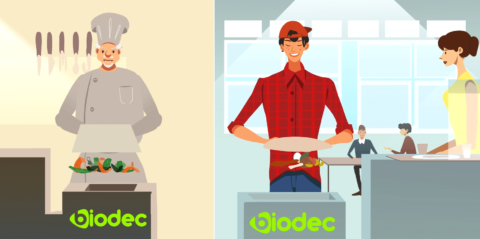Biodec+: controlled and stress-free management
Food waste has become a complex issue in the catering industry.
Because of the large number of meals served, the volume of food waste, whether from plates returned at the end of a meal or from food preparation, can quickly become significant (often 100 kg per day and more). This represents a major internal logistical challenge for the restaurant: where and how should the garbage cans be managed? How to manage the associated loads? How and where should they be stored until they are removed?

This complexity can be explained by the twofold problems to which food waste is subject:
- Health issues
- Environmental issues
Each has its own specific regulations:
The environmental issue has taken on increasing importance recently, which is both legitimate and desirable, with the strengthening of legislation on sorting and recovery obligations for food waste. In France, food waste can be recycled in approved composting or methanization centers. There is therefore significant pressure on operators of collective restaurants to comply with these regulations. However, the restaurant is dependent on the existence or non-existence of approved centers able to receive its waste. It has to be recognized that, depending on the geographical area, solutions are not always available. However, the implementation of this food waste management chain is crucial, and it is likely that the extension of this obligation to households by 2024 will accelerate the implementation of these solutions. It will be interesting to see how solutions can be pooled, while respecting the specific characteristics of the various food waste producers: households, commercial catering, collective catering, agri-food industries, etc. It seems important to take into account the specific realities of each: the canteen of an inner-city high school will not be able to rely on a local composter, often managed on a voluntary basis, etc.
In addition to this environmental issue, it is essential not to forget the health issues which also has its own specific challenges. This brings us back to the heart of the restaurant, which is subject to stringent Sanitary Control Plans. The restaurant's food waste is Kitchen and Table Waste, which acquires the status of Animal By-Products, implying specific challenges and constraints (preservation methods, non-crossing with clean equipment or food, disinfection, etc.). Restaurant staff is involved in a difficult management task, which requires to control flows and the associated inconveniences: carrying loads, unpleasant odors, contact with dirty products, etc.
Focusing on the challenges of value creation should not make us forget the health issues. Each link in the chain must be taken into account in its own specific way: from the place where the waste is produced, through transport, to the recycling center. The coming years will be both busy and exciting as we build new virtuous chains..
